|
|
|
Sort Order |
|
|
|
Items / Page
|
|
|
|
|
|
|
| Srl | Item |
| 1 |
ID:
114094
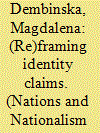

|
|
|
|
|
| Publication |
2012.
|
| Summary/Abstract |
How do we account for the reinforcement of identity particularisms despite transnational integration? This paper addresses the question by comparing two ethnolinguistic groups, Silesians and Kashubs in Poland. It is argued that in order to obtain state protection and tools to develop and survive, ethnic entrepreneurs adjust to institutions and discourses. Census politics, state laws' elaboration, transnational institutions represent openings to which groups adjust by reframing identity claims. In doing so, they re-imagine and reinforce their communities. Following Rogers Brubaker, group-making is presented as an eventful process where ethnic elites invest identity categories with groupness by taking advantage of opportunity windows at hand. Further, tracing changing political opportunities, strategic adjustments and groups' boomerang effect bid, the paper embeds identity groups within the social movement literature.
|
|
|
|
|
|
|
|
|
|
|
|
|
|
|
|
| 2 |
ID:
114095
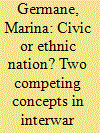

|
|
|
|
|
| Publication |
2012.
|
| Summary/Abstract |
This article examines the historical development of the two different concepts of the Latvian nation: the one that included the equal participation of all ethnic groups residing in Latvia, and the one that put them at the margins of the new state. In 1919, citizenship was granted to all Latvian residents irrespective of their ethnicity, while the Law on Minorities' Schools established a framework for cultural autonomy. National unity was perceived as being crucial to state independence, and remained central to political debates in the first republic. However, similarly to elsewhere in Central and Eastern Europe, the creation of the political nation faced a number of serious domestic and international challenges. The worldwide economic depression and the parliamentary crisis of the 1930s finally tipped the scale in favour of the ethnic version of the Latvian nation. Nevertheless, even seventy years later, the brave multicultural experiment in this small Baltic country resonates with modern debates on nation-building and minority rights.
|
|
|
|
|
|
|
|
|
|
|
|
|
|
|
|
| 3 |
ID:
114096
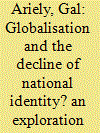

|
|
|
|
|
| Publication |
2012.
|
| Summary/Abstract |
The relationship between globalisation and national identity is puzzling. While some observers have found that globalisation reduces people's identification with their nation, others have reached the opposite conclusion. This article explores this conundrum by examining the relationship between globalisation and people's feelings towards national identity. Using data from the International Social Survey Program National Identity II () and the World Values Survey (), it analyses these relations across sixty-three countries. Employing a multilevel approach, it investigates how a country's level of globalisation is related to its public perceptions towards different dimensions of national identity. The results suggest that a country's level of globalisation is not related to national identification or nationalism but it is related negatively to patriotism, the willingness to fight for the country and ethnic conceptions of membership in the nation. An examination of alternative explanations indicates that globalisation has a distinct impact on national identity.
|
|
|
|
|
|
|
|
|
|
|
|
|
|
|
|
| 4 |
ID:
114097
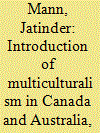

|
|
|
|
|
| Publication |
2012.
|
| Summary/Abstract |
This article compares the emergence of a policy of multiculturalism in Canada and Australia between the 1960s and 1970s. It charts the rise of the policy in the two countries through the adoption of a philosophy of multiculturalism as the basis of their national identities. There is a distinction between philosophy and policy: a multicultural policy emerged out of a philosophy of multiculturalism. Furthermore, a philosophy of multiculturalism replaced the 'new nationalism' as the foundation of the national identities of both English-speaking Canada and Australia. The abandonment of the White Canada and White Australia policies and the adoption of non-discriminatory immigration policies in both countries were also of importance in the emergence of a policy of multiculturalism. There are many similarities in the Canadian and Australian experiences. However, the major differences are explained by the presence of the French-Canadians in Canada and the early non-British migration that Canada received in the late-nineteenth century compared with Australia.
|
|
|
|
|
|
|
|
|
|
|
|
|
|
|
|
| 5 |
ID:
114093


|
|
|
|
|
| Publication |
2012.
|
| Summary/Abstract |
When the Irish Free State was founded in 1922, the Irish language was a substantial feature of the politics that led up to this event. Subsequently the language was recognised as the national and first official language of the Irish Free State. Since then, the de jure position of Irish appears to have evolved. Most recently, legislation was introduced in the Republic of Ireland, and statutory duties were placed upon certain public bodies with regard to the Irish language in Northern Ireland. This article examines this historical shift in the status of Irish in the two political jurisdictions in Ireland, the Republic of Ireland and Northern Ireland [as a part of the United Kingdom of Great Britain and Northern Ireland (UK)], and explains its significance.
|
|
|
|
|
|
|
|
|
|
|
|
|
|
|
|
| 6 |
ID:
114098
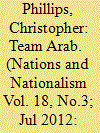

|
|
|
|
|
| Publication |
2012.
|
| Summary/Abstract |
The linking of living rooms across state borders by al-Jazeera and other pan-Arab satellite television channels has prompted claims that a 'new Arabism' that undermines state nationalism is emerging. Until now, analysts have mostly focused on the 'hot' Arabism in the news coverage of politicised events such as the Israel-Palestine conflict. This article offers a new dimension by suggesting that as important to satellite television's construction and reproduction of Arab identity is the everyday discourse found in less overtly political programmes such as sport. To demonstrate this, it offers an analysis of al-Jazeera's coverage of the 2008 Beijing Olympics showing how the broadcasts address viewers as a common Arab audience who are simultaneously encouraged to be nationalistic towards their separate nation-states within a given 'Arab arena' of states with whom they should primarily compete. This suggests that new Arabism should in fact be considered a 'supranationalism', not a revived Arab nationalism as it simultaneously promotes Arab and state identities in tandem. Finally, it aims to expand our understanding of 'everyday nationalism' by adapting Michael Billig's theory and methodology of 'banal nationalism' in British newspapers to facilitate the study of sport on supranational Arab identity on satellite television.
|
|
|
|
|
|
|
|
|
|
|
|
|
|
|
|
| 7 |
ID:
114092
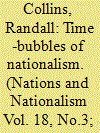

|
|
|
|
|
| Publication |
2012.
|
| Summary/Abstract |
The growth of modern nationalism can be attributed to structural causes, especially the growth of the strong bureaucratic state that penetrates society, creating cultural uniformity and national identity. But structurally based nationalism need not be very intense, or constant; even when institutionalised in periodic formal rituals, it can be routine, low in emotion - even boring. We need to explain sudden upsurges in popular nationalism, but also their persistence and fading in medium-length periods of time. Nationalist surges are connected with geopolitical rises and falls in the power-prestige of states: strong and expanding states absorb smaller particularistic identities into a prestigious whole; weaker and defeated states suffer delegitimation of the dominant nationality and fragment in sudden upsurges of localising nationalities. Passing from macro-patterns to micro-sociological mechanisms, conflict producing solidarity is a key mechanism: dramatic events focus widespread attention and assemble crowds into spontaneous 'natural rituals' - mass-participation interaction rituals, as distinct from formal rituals. Evidence from public assemblies and the display of national symbols following the terrorist attacks of 11 September 2001 (9/11) shows an intense period of three months, then gradual return to normal internal divisions by around six months. Spontaneous rituals of national solidarity are produced not only by external conflict but by internal uprisings, where an emotional upsurge of national identity is used to legitimate insurgent crowds and discredit regimes. Although participants experience momentary feelings of historic shifts, conflict-mobilised national solidarity lives in a 3-6-month time-bubble, and needs to institutionalise its successes rapidly to have long-term effects.
|
|
|
|
|
|
|
|
|
|
|
|
|
|
|
|
| 8 |
ID:
114099
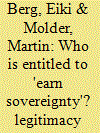

|
|
|
|
|
| Publication |
2012.
|
| Summary/Abstract |
Abkhazia and Nagorno-Karabakh are internationally unrecognised political entities, or so-called de facto states, that have emerged as a result of the incomplete and contested state-formation of their parent states and of the secessionist movements that emerged in the power vacuum of the post-Soviet space. In addition to examining the conventional reliance on the self-determination principle, usually followed by a call for international recognition (as often practised by emerging sovereigns), this article aims to survey whether these political entities have proved that they embody 'rightful authority' as such and whether they 'have earned their sovereignty'. In other words, it attempts to examine the self-determination claims in Abkhazia and Nagorno-Karabakh based on legitimacy criteria that are widely accepted for liberal democratic societies using an analysis of the respective issues as they were represented in focus-group discussions in these two regions.
|
|
|
|
|
|
|
|
|
|
|
|
|
|
|
|
|
|
|
|
|